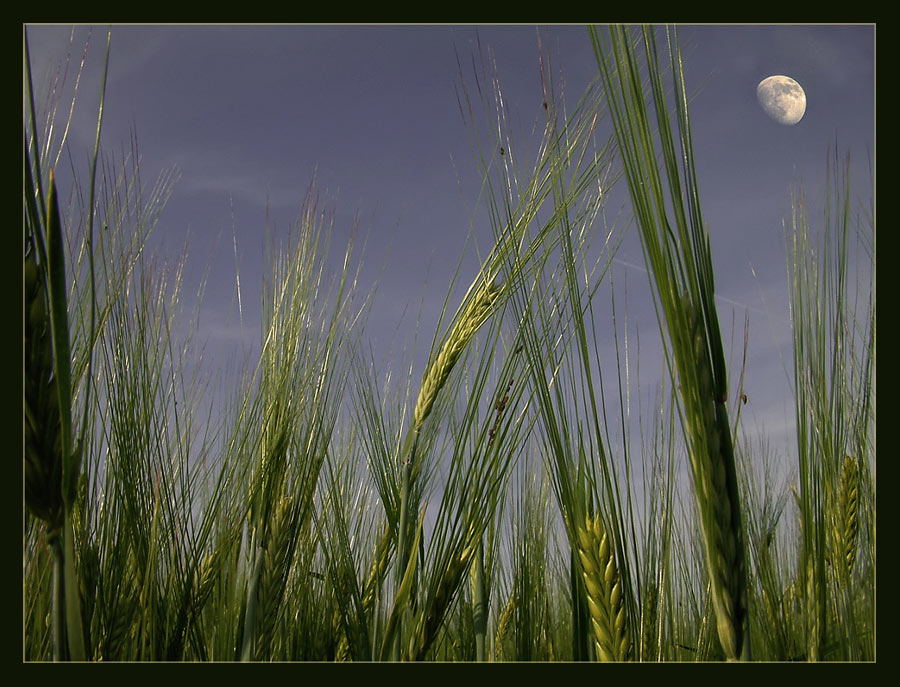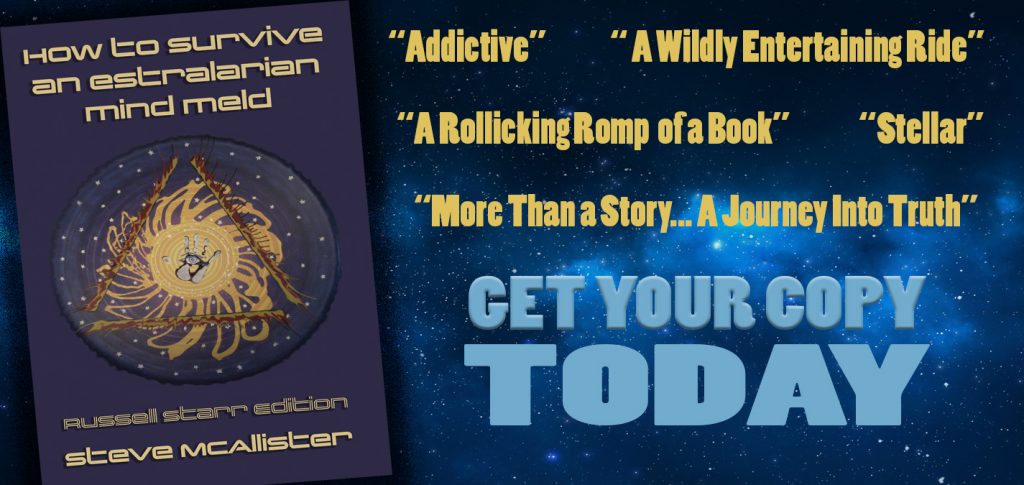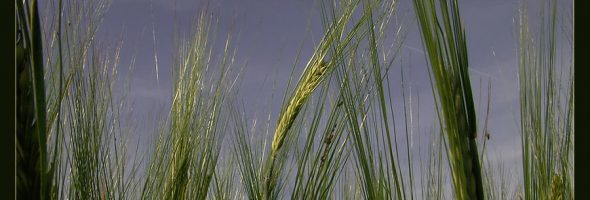
A moment before, I was sitting in my room, staring into the oblong eyes of an alien being. A moment before that, my world had been swirling around me as if I was a character in an anime cartoon. As I stared into those glistening orbs, I was drawn into them as if I’d been drawn back into a slingshot and released, hurling headlong into the mind of an alien race.
There was a light before me that grew larger as I moved rapidly toward it. It started as a glowing white dot and brightened to blue before the edges became tinged with green clouds. Though I felt no physical momentum in the movement, my body rocked forward as I stopped at the edge of a cave that looked over a vast wilderness.
The cave opening was lined with a wreath of vegetation. Beyond it was a long valley, teeming with trees, shrubs and a variety of wildlife. I stared in awe at a herd of beasts that I had only heard about in stories of natural history and seen in movies. I blinked and rubbed my eyes in astonishment as the large creatures moved placidly along the valley floor below me.
“Beautiful, aren’t they?” Yewell said as he stepped from behind me and stood to my right.
“Am I really seeing this?” I said.
Yewell waved his hand in front of my face, at which I bobbed to keep my eyes on the huge beasts.
“Apparently,” he said.
“Are those really woolly mammoths?”
“No. Don’t be ridiculous.”
“Don’t be ridiculous? You just shot me into the Jurassic period, and you’re telling me to not be ridiculous?”
“First of all,” Yewell explained, “you’re at the dawn of the Neolithic period. Secondly, those are mastodons.”
“Oh, of course. How could I have been so stupid?”
“It’s a common mistake,” he reassured.
“What the heck am I doing here?”
Iman emerged on the other side of me. “They’re something, aren’t they?” he said. “Sure was a shame to see them go.”
“See them go?” I said. “Why did they have to go?”
“It was the end of their cycle,” Yewell explained. “For everything, there is its time. This was their time.”
“What time is this exactly?”
“Look out over there,” Iman pointed out to a clearing in the valley.
I looked to see a group of biped creatures emerging from the foliage. They walked slightly hunched over, naked as the day they were born, but with seemingly no sense of shame at their lack of wardrobe.
“This,” Yewell said, “is the dawn of humanity as you know it.”
There seemed to be about a dozen of them. Three women, four men, and five children. The men seemed to be scanning the area as the women and children dug in the ground and gathered fruit from the trees.
“Those are people?” I said.
“They are now,” said Iman.
“What’s that supposed to mean?”
“They’ve just become aware of themselves as such.”
“What were they before?”
“Unconscious of the difference.”
“The difference?” I asked.
“The difference between themselves and the rest of the world,” said Iman. “Some of your kind consider this the rise of humankind. Others refer to it as the fall of man. But they have only recently realized that they are different, and that there are differences throughout the world.”
“What do you mean?”
“You’ve heard the story of Adam and Eve, right?”
“Of course.”
“Well, you’re witnessing it.”
“I thought that was just a story,” I said.
“It is,” said Yewell, “but it’s also completely true in a parabolic sort of way.”
“But there are a few of them down there. I thought there was supposed to be one man and one woman.”
“Adam means `man’,” Yewell said. “Did you really think there was just one?”
“I don’t know. I guess.”
“Well, there was just one initially, as with all living creatures, but life multiplies pretty rapidly. By the time they became self conscious, there were quite a few of them running around.”
“You mean there are more of them?”
“There’s always more to life than what you see. Look over there.”
He pointed to another clearing where another group of humans foraged for food. Some of the women were gathering large leaves and stripping the flesh from the stems.
“What are they doing?” I asked.
“You’re looking at the first fashion designers.”
As the women worked, they fashioned the vegetation into primitive clothing and used it to cover their lower halves.
“I thought they were supposed to be fig leaves,” I said.
“They’re working their way up to that. Gotta walk before you can run, you know.”
One of the mastodons strayed from the herd and walked toward the humans. It wandered among them, seemingly oblivious to their presence as it ate leaves from the nearby trees.
“Why aren’t they afraid of each other? Shouldn’t they be killing it for food or something?
“They haven’t gotten to that point yet,” said Yewell. “They’re still vegetarians.”
“They’ve only recently become aware of the yearning for more,” said Iman. “Up until this point, they’ve been quite satisfied with what has been offered to them just by their very being.”
“So what changed?” I asked.
“They’ve started to realize that they can use the fruits of the earth to create new things for themselves. They’ve started to realize that they can be the master of their own fates, so to speak.”
“Wait a minute,” I said. “You said a minute ago that this was the Fall of Man. Isn’t there supposed to be a snake tempting them to eat some fruit?”
“What does the snake do?” Yewell asked.
“Slithers. Hisses. Bites people.”
“Some do. What do all of them do as they grow?”
“Shed their skin,” I said.
“And that is what humanity is doing,” said Iman. “They are leaving behind the life that they knew, when they just accepted what life offered them and lived off of the abundance of nature as part of it, and venturing out for themselves in search of a better way.”
“What about the whole knowledge of good and evil thing?” I asked.
Iman nodded. “They go hand in hand. You see, mankind has begun to realize their separation from the rest of the world. They have actually begun to manipulate their separation from the rest of the world. They have reached a point in their consciousness where they now regard the other animals as `them’ and themselves as `us’.”
“Humans have seen the gifts that have been offered to them,” Yewell continued, “the opposable thumbs, the ability to walk upright, their newfound talents of communication, and judged themselves better than the rest of creation. Not only have they judged humanity as superior to the rest of the world, but they will soon create these distinctions among themselves.”
“I don’t understand. If this is considered the rise of mankind, why is it also considered the fall?”
“This is where suffering truly began,” Yewell said. “Before this time, life just happened. Its variety of occurrences weren’t judged as good and bad, they just were. Death was an occurrence. Pain was a sensation. But these things were part of the natural order of things.”
“But as people became attached to one another,” said Iman, “death became a negative because it took away from them something that they cherished. Finding newfound pleasures in life made pain something to be avoided. And the ability to craft tools and manipulate the surroundings gave them visions for new things to come.”
“But isn’t it just human to want more from life?” I asked.
“Exactly,” said Iman.
“Well why is that considered the fall?”
“The Buddhists have a good handle on it,” said Yewell. “They state in their first noble truth that all life is suffering.”
“That’s rather bleak,” I said.
“In a manner of speaking, it is. But the second noble truth is that suffering is caused by desire. You see, up until this point, mankind wanted for nothing. They were born, they died, and in the meantime, they lived in relative bliss off of the life that was provided to them.”
“But now,” Iman continued, “they want more. Which means that their yearnings bring them pain. And the fact that they have to work for it brings them more pain.”
“And that they will soon fight one another for it,” Yewell said, “will bring them even more pain.”
“But if humans never reached for greater plateaus, they would never know the thrill of victory,” I said.
“Nor the agony of defeat.”
“You see,” Iman said, “even in the consideration of man’s supposed evolution, there is the concept of good and evil. Was this a good thing for them to separate themselves from the way things were and the unity they felt with the world? Some would say yes and some would say no.”
“And from this moment on,” Yewell continued, “all of mankind’s progress will be questioned in the same way.”
This is an excerpt from How to Survive an Estralarian Mind Meld. Come back weekly for the next part or order your copy in ebook or paperback today!


